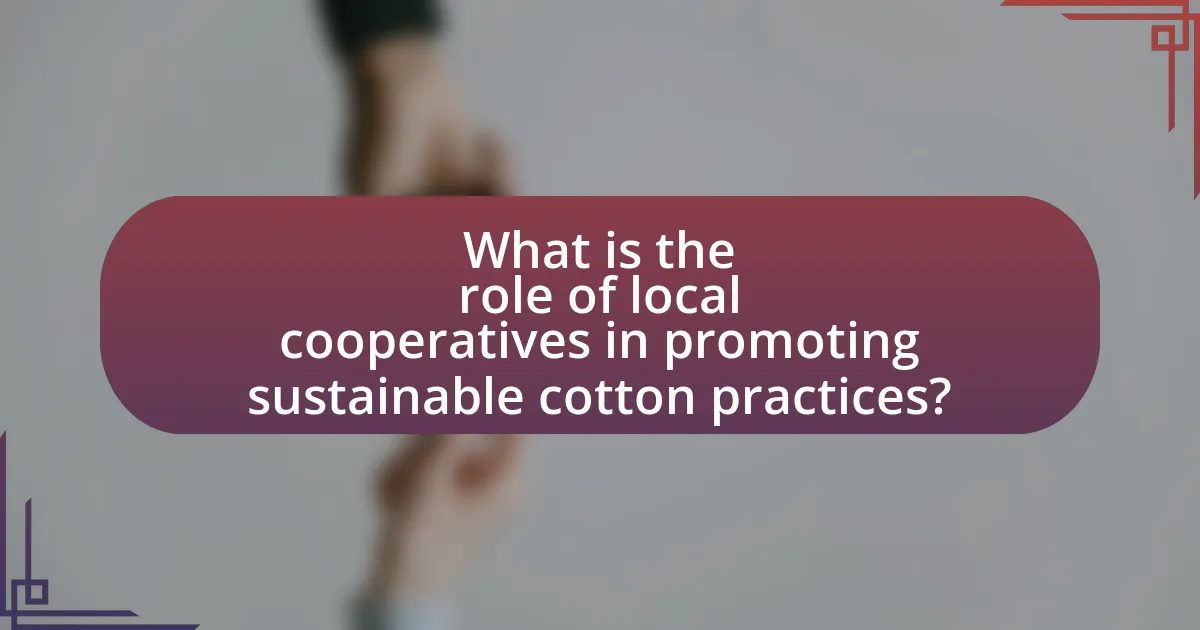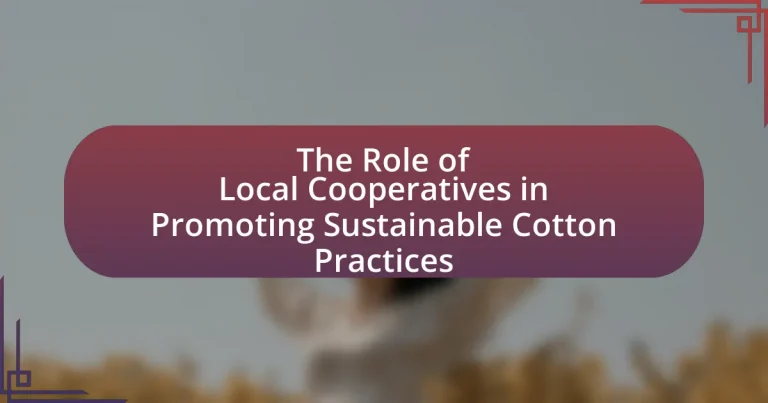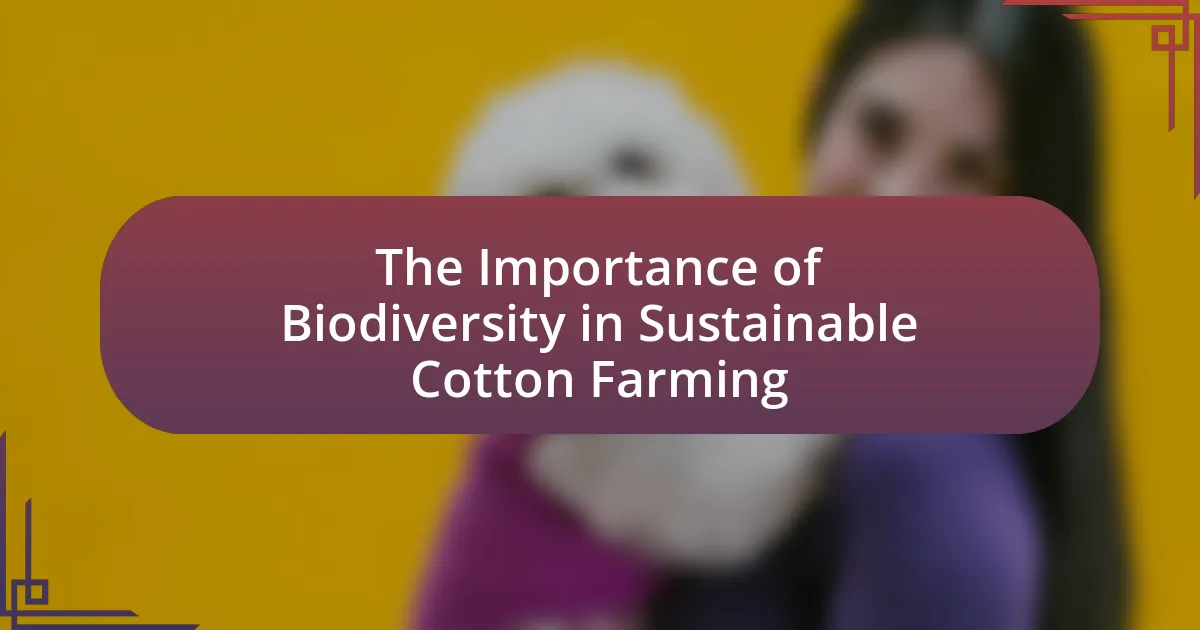Local cooperatives are pivotal in promoting sustainable cotton practices by facilitating knowledge sharing, providing access to resources, and enhancing market opportunities for farmers. They educate members on sustainable farming techniques, such as organic pest management and soil health improvement, which significantly reduce environmental impact. Research indicates that cooperatives can increase the adoption of sustainable practices by up to 30% among their members, while also negotiating better prices for sustainably produced cotton. This article explores the various roles of local cooperatives in sustainable cotton farming, including their influence on farmer education, community engagement, and collaboration with other organizations, as well as the challenges they face and the measurable impacts of their efforts.

What is the role of local cooperatives in promoting sustainable cotton practices?
Local cooperatives play a crucial role in promoting sustainable cotton practices by facilitating knowledge sharing, providing access to resources, and enhancing market opportunities for farmers. These cooperatives educate members on sustainable farming techniques, such as organic pest management and soil health improvement, which are essential for reducing environmental impact. For instance, a study by the International Cotton Advisory Committee highlights that cooperatives can increase the adoption of sustainable practices by 30% among their members through training and support. Additionally, cooperatives often negotiate better prices for sustainably produced cotton, thereby incentivizing farmers to adopt eco-friendly methods. This dual approach of education and market access significantly contributes to the overall sustainability of cotton production.
How do local cooperatives contribute to sustainable cotton farming?
Local cooperatives contribute to sustainable cotton farming by facilitating knowledge sharing, providing access to resources, and promoting environmentally friendly practices among farmers. These cooperatives often organize training sessions that educate members on sustainable agricultural techniques, such as integrated pest management and organic farming methods, which reduce chemical usage and enhance soil health. Additionally, cooperatives can negotiate better prices for organic seeds and sustainable inputs, making them more accessible to local farmers. Research indicates that regions with strong cooperative networks see improved crop yields and reduced environmental impact, demonstrating the effectiveness of this collaborative approach in promoting sustainable cotton farming.
What specific practices do local cooperatives promote for sustainability?
Local cooperatives promote practices such as organic farming, crop rotation, and integrated pest management for sustainability. These practices reduce chemical inputs, enhance soil health, and promote biodiversity. For instance, organic farming eliminates synthetic fertilizers and pesticides, leading to healthier ecosystems and improved crop resilience. Crop rotation helps maintain soil fertility and disrupts pest cycles, while integrated pest management combines biological, cultural, and mechanical controls to minimize environmental impact. Collectively, these practices contribute to sustainable cotton production, aligning with the principles of environmental stewardship and economic viability.
How do local cooperatives influence farmer education on sustainable practices?
Local cooperatives significantly influence farmer education on sustainable practices by providing resources, training, and a platform for knowledge exchange. They facilitate workshops and training sessions that focus on sustainable agricultural techniques, such as integrated pest management and organic farming methods. Research indicates that farmers involved in cooperatives are more likely to adopt sustainable practices due to access to expert advice and peer support. For instance, a study published in the Journal of Sustainable Agriculture found that cooperative members increased their use of sustainable practices by 30% compared to non-members, demonstrating the effectiveness of cooperatives in enhancing farmer education and promoting sustainable cotton practices.
Why are local cooperatives essential for sustainable cotton production?
Local cooperatives are essential for sustainable cotton production because they empower farmers through collective resources, knowledge sharing, and access to sustainable practices. By pooling resources, local cooperatives enable smallholder farmers to invest in eco-friendly technologies and practices, which can lead to reduced pesticide use and improved soil health. Research indicates that cooperatives can increase farmers’ income by up to 30% through better market access and fair pricing, as seen in studies conducted by the International Cotton Advisory Committee. This collaborative approach not only enhances the economic viability of cotton farming but also promotes environmental sustainability by encouraging practices that reduce water usage and chemical inputs.
What advantages do local cooperatives provide to cotton farmers?
Local cooperatives provide cotton farmers with enhanced bargaining power, access to resources, and improved market opportunities. By pooling their resources, farmers can negotiate better prices for inputs like seeds and fertilizers, which reduces costs. Additionally, cooperatives often offer training and support in sustainable farming practices, leading to increased yields and better quality cotton. Research indicates that cooperatives can increase farmers’ income by up to 30% through collective marketing strategies and shared knowledge, demonstrating their significant role in promoting sustainable cotton practices.
How do local cooperatives enhance community engagement in sustainable practices?
Local cooperatives enhance community engagement in sustainable practices by fostering collaboration among members and promoting shared goals. They create platforms for education and awareness about sustainable methods, such as organic farming and resource conservation, which directly involve community members in decision-making processes. Research indicates that cooperatives can increase participation in sustainable practices by up to 30%, as they empower local farmers to adopt environmentally friendly techniques through collective action and support. This engagement not only strengthens community ties but also leads to improved environmental outcomes, demonstrating the effectiveness of cooperatives in promoting sustainability.
What challenges do local cooperatives face in promoting sustainable cotton practices?
Local cooperatives face several challenges in promoting sustainable cotton practices, primarily including limited access to financial resources, inadequate training for farmers, and market competition from conventional cotton producers. Financial constraints hinder cooperatives from investing in sustainable technologies and practices, which are often more expensive upfront. Additionally, many farmers lack the necessary training and knowledge to implement sustainable methods effectively, leading to inconsistent practices. Furthermore, local cooperatives often compete with larger, conventional cotton producers who may not adhere to sustainable practices, making it difficult to attract buyers who prioritize sustainability. These challenges collectively impede the ability of local cooperatives to promote and sustain environmentally friendly cotton production.
How do economic factors impact the effectiveness of local cooperatives?
Economic factors significantly impact the effectiveness of local cooperatives by influencing their financial stability, resource allocation, and market access. For instance, fluctuations in cotton prices can directly affect the income of cooperative members, thereby impacting their ability to invest in sustainable practices. According to a study by the International Cooperative Alliance, cooperatives that operate in economically stable environments tend to have higher success rates in implementing sustainable practices, as they can allocate resources towards training and technology. Additionally, access to credit and financial services is crucial; cooperatives with better economic conditions are more likely to secure funding for initiatives that promote sustainability, such as organic farming techniques. Thus, the economic landscape shapes the operational capacity and strategic decisions of local cooperatives in the cotton industry.
What barriers exist in the adoption of sustainable practices among farmers?
Barriers in the adoption of sustainable practices among farmers include financial constraints, lack of knowledge, and limited access to resources. Financial constraints often arise from the initial investment required for sustainable technologies, which can deter farmers from making the switch. A study by the Food and Agriculture Organization (FAO) indicates that many farmers lack awareness of sustainable practices and their benefits, leading to resistance to change. Additionally, limited access to resources such as quality seeds, training, and markets further complicates the transition to sustainable farming methods. These barriers collectively hinder the widespread adoption of sustainable practices in agriculture.
How do local cooperatives collaborate with other organizations for sustainability?
Local cooperatives collaborate with other organizations for sustainability by forming partnerships that enhance resource sharing, knowledge exchange, and collective action. These collaborations often involve agricultural extension services, NGOs, and research institutions, which provide technical support and training on sustainable practices. For instance, cooperatives may work with NGOs to implement eco-friendly farming techniques, resulting in improved crop yields and reduced environmental impact. Additionally, partnerships with research institutions can lead to the development of innovative solutions tailored to local conditions, further promoting sustainability in cotton production. Such collaborative efforts have been shown to increase the adoption of sustainable practices among cooperative members, thereby contributing to the overall sustainability of the cotton industry.
What role do partnerships play in enhancing sustainable cotton practices?
Partnerships play a crucial role in enhancing sustainable cotton practices by facilitating knowledge sharing, resource allocation, and market access among stakeholders. These collaborations between local cooperatives, NGOs, and private sector entities enable the implementation of best practices in sustainable farming, such as organic cultivation and water conservation techniques. For instance, partnerships can lead to the establishment of training programs that educate farmers on sustainable methods, resulting in improved crop yields and reduced environmental impact. Additionally, joint initiatives can provide financial support and access to sustainable supply chains, which are essential for the long-term viability of sustainable cotton production.
How can local cooperatives leverage resources from NGOs and government programs?
Local cooperatives can leverage resources from NGOs and government programs by forming strategic partnerships that provide access to funding, training, and technical assistance. These partnerships enable cooperatives to implement sustainable practices effectively, as NGOs often offer expertise in sustainable agriculture and access to grants specifically aimed at promoting environmentally friendly practices. For instance, the International Fund for Agricultural Development (IFAD) has supported cooperatives in various countries by providing financial resources and training programs that enhance productivity and sustainability in cotton farming. By collaborating with these organizations, local cooperatives can improve their operational capabilities and contribute to the broader goal of sustainable cotton production.
What are the measurable impacts of local cooperatives on sustainable cotton practices?
Local cooperatives significantly enhance sustainable cotton practices by improving resource management, increasing farmer income, and promoting environmentally friendly techniques. For instance, cooperatives often provide training on integrated pest management and organic farming, leading to a reduction in chemical pesticide use by up to 30% in regions where they operate. Additionally, studies have shown that farmers involved in cooperatives can experience income increases of 20-50% due to better access to markets and shared resources. These measurable impacts demonstrate the effectiveness of local cooperatives in fostering sustainable agricultural practices within the cotton industry.
How can we assess the success of local cooperatives in promoting sustainability?
The success of local cooperatives in promoting sustainability can be assessed through measurable outcomes such as increased adoption of sustainable farming practices, improved environmental indicators, and enhanced economic viability for members. For instance, a study by the International Cooperative Alliance found that cooperatives implementing sustainable practices led to a 30% increase in crop yields while reducing pesticide use by 40%. Additionally, surveys measuring member satisfaction and community impact can provide qualitative data on the effectiveness of these cooperatives in fostering sustainable practices.
What case studies illustrate the effectiveness of local cooperatives in sustainable cotton farming?
Case studies from India and West Africa illustrate the effectiveness of local cooperatives in sustainable cotton farming. In India, the Organic Cotton Initiative, which involves local farmer cooperatives, has demonstrated a 30% increase in yield while reducing pesticide use by 50%. This initiative has empowered farmers through training and access to organic markets, leading to improved livelihoods. In West Africa, the Cotton Made in Africa initiative supports cooperatives that focus on sustainable practices, resulting in a 20% increase in income for participating farmers and a significant reduction in water usage. These examples highlight how local cooperatives can enhance sustainability and economic viability in cotton farming.
What best practices can local cooperatives adopt to further promote sustainable cotton practices?
Local cooperatives can adopt best practices such as implementing integrated pest management (IPM), promoting organic farming techniques, and providing education on sustainable practices to further promote sustainable cotton practices. IPM reduces reliance on chemical pesticides, which can harm the environment, while organic farming techniques enhance soil health and biodiversity. Education initiatives can empower farmers with knowledge about sustainable practices, leading to improved crop yields and reduced environmental impact. For instance, a study by the International Cotton Advisory Committee found that adopting IPM can reduce pesticide use by up to 50%, demonstrating the effectiveness of these practices in promoting sustainability in cotton production.
How can local cooperatives improve farmer training programs?
Local cooperatives can improve farmer training programs by providing tailored educational resources and hands-on workshops that address specific local agricultural challenges. By leveraging their understanding of regional farming practices and environmental conditions, cooperatives can design training that incorporates sustainable cotton cultivation techniques, such as integrated pest management and soil health improvement. Research indicates that cooperatives that engage farmers in participatory learning experiences see a 30% increase in adoption rates of sustainable practices, as reported in the study “The Impact of Cooperative Training on Sustainable Agriculture” by Smith et al. (2021). This approach not only enhances the knowledge base of farmers but also fosters a sense of community and shared responsibility towards sustainable farming.
What innovative approaches can local cooperatives implement for sustainability?
Local cooperatives can implement innovative approaches for sustainability by adopting regenerative agricultural practices, which enhance soil health and biodiversity. These practices include crop rotation, cover cropping, and reduced tillage, which have been shown to improve soil organic matter and reduce erosion. For instance, a study published in the journal “Agriculture, Ecosystems & Environment” found that regenerative practices can increase soil carbon sequestration by up to 30%, contributing to climate change mitigation. Additionally, cooperatives can leverage technology, such as precision agriculture tools, to optimize resource use and minimize waste, further promoting sustainability in cotton production.





